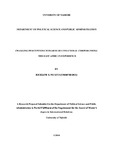| dc.description.abstract | The purpose of this study was to examine the changing perceptions towards Kenyan multinationals in the East Africa. This study was therefore guided by two objectives, namely: To determine how perceptions towards Kenyan Multinational in the East Africa have changed and to identify factors contributing to change of perceptions towards Kenyan Multinationals. The study used descriptive research design with qualitative methodologies for the collection of data. Data was therefore sourced through in depth interviews and questionnaires administered to key informants. Key informants constituted senior government officers from ministry of foreign affairs, ministry of trade, Commerce and regional integration, Directors of Regional Institutes, senior investment analyst of multinational corporation both local and foreign operating in East Africa. Content analysis was used to organise data into various themes. Regarding the first objectives of the study, the findings revealed that, perception towards Kenyan multinationals have changed. Kenyan multinationals in the defunct EAC were perceived as exploitative and agents of foreign control both for the colonialist and non colonialist. These perceptions were informed by a number of factors. Most multinationals operating from Kenya were largely from Britain, led by Whites, they enjoyed monopoly and had little local investment to build capacity in the host states. Moreover because of the source of their capital, these corporations were simply perceived as being exploitative. Kenyan multinationals were perceived as agents of economic benefits and more importantly as agents of local capital. These perceptions were grounded on a number of factors. First, the desire for economic prosperity: both in Uganda and Tanzania in the 1980s; change in the international system, characterised by the collapse of the Soviet Union and the end of the Cold War, and the emergence of a new economic order, largely pro-market, and a new leadership with a cultivated political good will. The change in the modus operandi, to focus more on green investments, capacity building, corporate social responsibility, also gained Kenyan multinationals confidence and trust from the host states. The study made the following recommendation: There is need for enhanced training and capacity building of human resource personnel in the EAC partner states to take up leading positions in multinationals operating in their home states. The study also recommended the enforcement and intensification of redistributive mechanism within the EAC to ensure that members‟ states are not left as captive markets but also benefit from the capital accumulation in the region. The study also recommended the establishment of regional corporate social responsibility framework to ensure the ploughing back of profits to the EAC economies | en_US |

